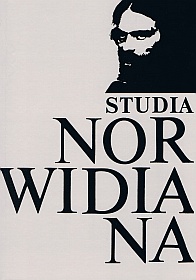Norwidowski wariant tematu słowiańskiego na romantycznym tle
Abstrakt
The Slavonic theme was one of the important motifs in the reflection present in the Polish literature of the 19th century. It appeared in literary works, in journalism, and in literary criticism – taken up in several contexts: historiosophical, esthetic and political ones. Questions and controversies connected with it were formulated as early as the beginning of Romanticism in Kazimierz Brodziński’s and Zorian Dołęga Chodakowski’s treatises, and the Paris lectures on Slavic literature delivered by Adam Mickiewicz (1840-1844) were the most complete development of the subject. The motif can be found in works of every Polish writer belonging to the Romantic epoch. The present article both outlines the whole panorama and points to particular aspects of the Polish thought about Slavism and attempts to give an answer to the question about what position Norwid’s reflection has against this background, as in his works Slavic motifs with different intensity are present from the end of the 1840s to the last years of his life (the poem The Slav written in 1882). It points to both similarities to Brodziński’s, Mickiewicz’s, and Krasiński’s thought, and to an original character of Norwid’s reflection resulting first of all from the ever present in Norwid’s works tendency to confront Slavism with the Christian universalism. The values from the perspective of which Norwid takes up the subject are: freedom and hope understood not only in the political meaning, but also in the existential and religious sense. Such a view allowed the poet to avoid Slavophil tones and to maintain distrust of Pan-Slavism as a political doctrine. Analyses of Norwid’s works listed in the chronological order reveal the evolution of the poet’s ideological position: from hopes of a philosopher of history to doubts of an ironist. They also emphasized a multitude of aspects of this subject that are connected with the variety of ways to talk about it. Slavic motifs appear in dramatic mysteries (Wanda, Krakus) and in poems (e.g. The Song of Our Land, Chopin’s Piano, The Slav), in poetic treatises (Bondage, About Freedom of Speech), in discussions and letters.
Copyright (c) 2013 Studia Norwidiana

Utwór dostępny jest na licencji Creative Commons Uznanie autorstwa – Użycie niekomercyjne – Bez utworów zależnych 4.0 Międzynarodowe.





